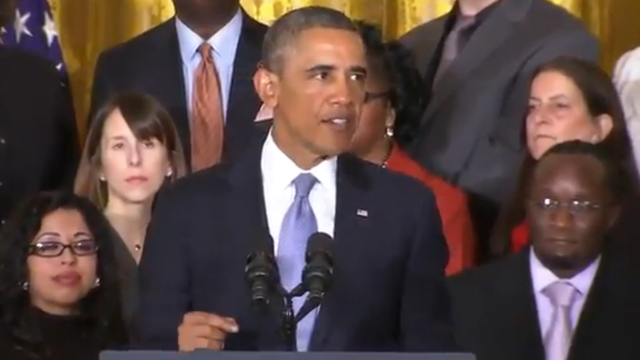Why Does Obama Want To Extend Unemployment, Aren't We Four Years Into An Economic Recovery?

The Senate voted today to proceed to debate of an extension of unemployment benefits which expired in the new year (North Dakota Senator John Hoeven voted no, Senator Heidi Heitkamp voted with her party), and President Obama went on the attack against Republicans who are opposing the extension.
“Now, two weeks ago Congress went home for the holidays and let this lifeline expire for 1.3 million Americans,” he said. ” If this doesn’t get fixed, it will hurt about 14 million Americans over the course of this year — 5 million workers along with 9 million of their family members, their spouses, their kids.”
The thing is, prior to the Obama era, unemployment benefits were much shorter than they are today. They were extended temporarily during the economic meltdown at the beginning of Obama’s first term, and while we can debate the efficacy of that policy, aren’t we supposed to be four years into an economic recovery right now?
Obama talks of these temporarily extended benefits as a “lifeline” but Americans got along for decades at the previous level of unemployment benefits. Obama and Democrats want to make extended unemployment benefits the new normal, and that’s not a good thing.
President Obama laughed off the notion that expansive unemployment benefits remove the incentive to return to work:
Now, I’ve heard the argument that says extending unemployment insurance will somehow hurt the unemployed because it saps their motivation to get a new job. I — I really want to — I want to go at this for a second. (Audience murmurs.) I — you know, I — (applause) — that really sells the American people short. I meet a lot of people as president of the United States and as a candidate for president of the United States and as a U.S. senator and as a state senator. I — I meet a lot of people. And I can’t — I can’t name a time where I met an American who would rather have an unemployment check than the pride of having a job.
President Obama may not have met anyone who behaves that way, but it’s a well-document economic fact as David R. Francis explains:
Most people who receive unemployment insurance find a job or are recalled to work in the first several weeks. Meyer also found that among those who remain jobless for a longer period, the chance of a person on unemployment insurance going back to work increases rapidly as the time of benefit exhaustion approaches. Indeed, the chances of an unemployed person getting a job triples as the length of remaining benefits drops from six weeks to one week. Meyer suspects some of the jobless may have arranged to be recalled to previous work or to begin new work about the time their benefits expire. “If workers are bound to firms by implicit contracts, moving costs, specific human capital [education, experience, skills, etc.], or other reasons, firms have an incentive to base recall decisions on the length of UI [unemployment insurance] benefits,” noted Meyer in a study done for the National Bureau of Economic Research. Unionized firms tend to take greater advantage of this “layoff subsidy” than do non-union establishments. And not surprisingly, given the incentives, layoffs are more common for those eligible for unemployment benefits than for those not eligible. If benefits are extended beyond twenty-six weeks, the unemployed tend to stay out of work nearly a day longer, on average, for each week of the extension.
Lengthier unemployment benefits promote longer terms of unemployment. The pre-Great Recession unemployment benefits are sufficient. Extending the expanded benefits will only ensure protracted economic malaise.
If we want people to go back to work, we have to stop subsidizing unemployment.




